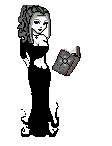

CONTEMPORARY CONCERNS, 2020


CONTEMPORARY CONCERNS, 2020

From the Pastel Goth trend of the early 2010s to Katy Perry's 2014 hit single, "Dark Horse", witchery in popular culture has shifted into a pale, thin remnant of its previous defaults. A quick online search yields comments disapproving of the gentrified, pop culture of witchcraft used by predominantly white female artists. Scrolling through Youtube, many comments follow themes of, "Did I just witness a satanic ritual?", "....that performance was incredibly satanic", and many such as "...straight up witchcraft going on and people are still blind to it". While mainstream artists are not the full blame for the miseducation of the general public, they are not helping with witchcraft's general perception. If white women are receiving criticism from their own peers, what hope is there for black women? For black practitioners of faith? For curious prospects wanting to to dabble in witchcraft created for the modern era? The origin of African American witchcraft traces to West Africa and the consequential slave trade. Appropiately, African witchcraft fused with the traditions of Catholicism, Santeria, Vodou, and Candomble. Natural remedies such as water, plants, and candles provided a way to practice withcraft and provide hope to slaves as a method of taking a portion of, if any, autonomy away from white slaveowners and their families. In the same way, young black millenials embrace past withcraft rituals with newer generational touches. While being respectful to withcraft's religious roots, black millennial women swap spell books with emojis, prayer circles with altars, and incense for candles to combat romantic conflicts, mental health issues, negative energy, and career aspirations. Yet, given its negative rep from the general public, black witches often hide in urls, groups chats, and internet forums together to evade backlash from their own community and the general white public. Through opposition (which somewhat represent the troubles of their ancestors), modern black witches use their discreditation from society to provide a safe space for all black women.

There is debate concerning the whitewashing of witchcraft as seen through Tik Tok, the Black Lives Matter protests in June, and stores such as Hot Topic, Spencers, and Etsy. Just like black people are not a monolith, black witches aren't either. Many appreciate the growing tolerance due to white witches and their influence on the general public, but still find comfort in the traditional black practices of witchcraft away from public misconceptions.
